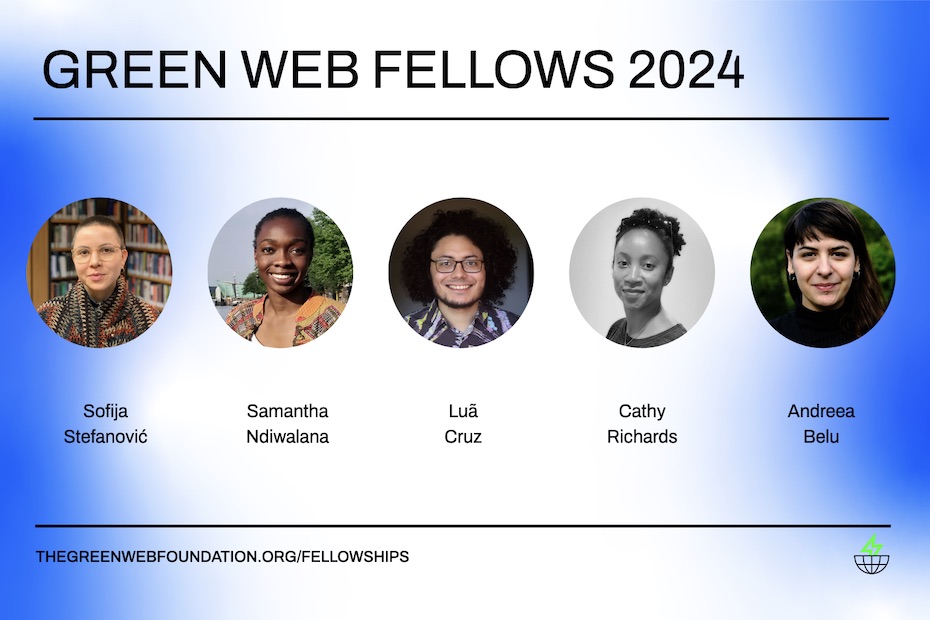Coming to the end of the Green Web Fellowship for 2024, it’s difficult to believe that it’s over. In a sense it’s not, because the fellowship has inspired me and given me the boost I needed to continue my research in this area. However, in a very real way, my time with the fellowship has come to an end. With this in mind, I wanted to take the time to reflect on this opportunity, sharing a roundup of my work and the direction I see this topic going.
Where did this all begin: Revolutions and Silver Bullets
South Africa, like many developing countries, sees industrialisation, particularly digitisation, as an opportunity to diversify from an extractive heavy economy. This move is seen as a way to leapfrog into the future, thereby addressing the litany of problems, including high youth unemployment, which plague the country in one fell swoop. In policy circles, this silver bullet is called the 4th Industrial Revolution, and as the name suggests, there will be a distinct before and after, with the post-revolution South Africa leading the technology race in Africa. However, as is often the case with silver bullet policies, things don’t always go as planned. In this case, various factors such as a small technically skilled workforce and a lack of infrastructure continue to scupper the government’s digitalisation plans. Data centres are seen as a two-in-one solution to this issue, as they represent infrastructure development and a step forward towards digitalisation.
Data Centres + Loadshedding + Water shortages = Crisis?
The bulk of the centres in South Africa are concentrated in Gauteng, near Johannesburg and Pretoria. These are highly populated and heavily industrialised areas awash with possibilities and infrastructure, often in stark contrast with most of the country. But how effective are data centres at galvanising the economy?
While a key argument used by data centre advocates is job creation, particularly in more disadvantaged contexts, in reality, the bulk of the job creation is transitory, taking place during the construction phase. Furthermore, it takes place in already established centres of commerce, rather than in rural or remote areas. Speaking to various stakeholders, this research found that in practice, day to day employment opportunities are limited as they are often technical in nature, a huge hurdle in the South African context. With this, and numerous other blockages in mind, one starts to question the true effectiveness of data centres as a development tool. Compounding this doubt are South Africa’s crumbling energy and water systems.
Since 2008, South Africa has faced regular sweeping blackouts called loadshedding which plunge the country into darkness and confusion, affecting the economy; but most importantly, the ability of individuals to live fully, as they are constantly at the mercy of the loadshedding schedule. In addition, in recent years, water shortages have been implemented across the country, leading to water rationing or even situations where there is no water left, and this resource is instead trucked in at regular intervals for collection and use by residents. If you’re lucky. South Africa’s high rates of inequality mean that most people experience the shortages as yet another situation where they are forced to go without basic services. In this context, data centres pose a unique risk of harm to the most disadvantaged through their heavy use of electricity and water. There is a growing body of research on the ecological impacts of data centres. Steven Monseratte discusses a range of impacts from wasted water, e-waste all the way to the health impacts of data centre noise. Given this background, could it be possible that the benefits of data centres outweigh the risks? Could this be a scenario where the potential risk to some of the most disadvantaged in South Africa is a necessary evil in order to bring the nation as a whole closer to achieving the 4th Industrial Revolution? These are some of the existential, socioeconomic and political questions that I sought to explore as part of this fellowship.
Painting by numbers: Moving step by step to fill in the bigger picture
I began this process by diving deep into a wide variety of literature on data centres. In doing so, I was able to learn more about the diverse perspectives on data centres, including the academic, business, governmental, and advocacy perspectives. Next, I began reaching out directly to people working in these fields, seeking to speak with people working for the national electricity provider, Eskom, all the way to the NGOs and the advocates focused on climate change. Some groups were more forthcoming than others. The process required a lot of determination in the face of silence and rejection. It was worth it, however; to be able to speak to a wide range of stakeholders.
I particularly enjoyed the conversations I had with climate activists at the forefront of South Africa’s grassroots climate change movement. It was inspiring to learn from people who take an intersectional approach to sustainability and believe in bringing everyone, even the most marginalised members of society along in the journey. The combination of desk research and interviews forms the base of this research, and helped me answer some, but not all of my questions. For example, I learnt that while data centres are not exempt from loadshedding, they are not forthcoming about how much energy or water they use. Although some centres are open to discussing their sustainability work, detailing how they offset energy consumption through the use of solar energy, it was evident that they were not open to discussing how much energy or water was used in the running of their data centres.
The bigger picture: This research as one part of a larger movement
One of the key findings of my research is the lack of transparency in how data centres operate and the subsequent impact they have on local communities. This mirrors findings across the world in South America, the United States and in Europe where similar opaqueness has been found by Sebastián Lehuedé, Bast et al. and Li et al. to name a few of the researchers in this space. In addition, information asymmetry, and power imbalances make it difficult for researchers and advocates to organise. All the while making it easier for big tech companies to lobby and pressure governments into agreements that place profits over people.
On the surface, it’s easy to see some of these results and feel small in the face of such a big and complicated issue. It can be disheartening. However, another key finding of my fellowship is the opportunity and strength that is possible in collective resistance. Thus far, activism on this topic has taken a “not in my backyard” approach to the issue, kicking the problem further down the road and into other communities. At its heart, this is a collective action issue, and my research has shown me that the answer is not found only in the ivory towers of academia or the corner office of the private sector consultant. It is found by taking a collective, intersectional and inclusive approach. This means speaking with and working with the people most affected, everywhere.
In this way, we create an opportunity for the climate justice and anti-data centres movements that are scattered around the world to come together. They can share their experiences, learnings and collaborate on a solution that addresses the problem, not only in my backyard, but everywhere. Collectivism is an important form of resistance, so that the West doesn’t repeat the mistakes of the past and ship services and businesses that they don’t like to look at to developing countries so they can enjoy benefits without having to face the daily consequences of living in developed luxury. There is a long way to go, and this research represents one step on that journey.



